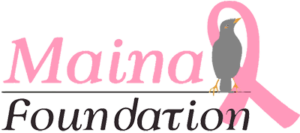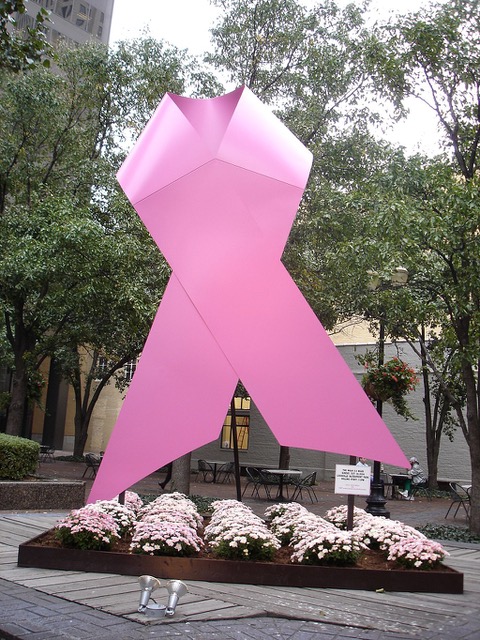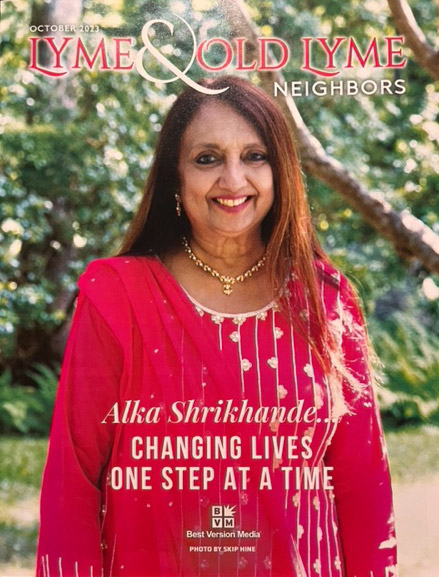
NEWSLETTER
October 2023

Welcome to the Maina Foundation Newsletter!
Breast Cancer Awareness Month:
A Brief History and Overview
Please support Maina Foundation in saving lives
By Manju Soni
Dear Friends,
October is Breast Cancer Awareness Month, and t’s a pretty personal one for me. At the age of 73, my mom felt a lump in her left breast, which she had ignored for a few months because she ‘didn’t want to bother anyone.’
After a number of tests, and a radioactive scan to see if there was any lymph node involvement, the doctor suggested a mastectomy. Of course, at this point we were devastated, with the possibility of chemotherapy with all its issues looming, we were convinced she was close to death.
Her mastectomy showed an invasive ductal cancer, with no spread to the local lymph nodes. Her oncologist sent the tissue for assessment for tumor markers. The results indicated she did not require any chemotherapy. She was given a 5-year course of Tamoxifen, an estrogen receptor modulator. And now, she’s been 11 years cancer free, and has lived long enough to see her three great grandchildren!
My lesson from this experience is firstly, my mom was lucky, and secondly, the diagnosis of cancer doesn’t have to be a death sentence.
But early detection is key. This is where organizations like Maina Foundation are so critical.
For this month’s newsletter, I’d like to review the history, and the controversies, of having a month, with all its pinkness, dedicated to breast cancer awareness.
Thank you to Breastcancer.org for being an excellent resource for this month’s newsletter.
What is Breast Cancer Awareness Month?
Held on October every year, Breast Cancer Awareness Month aims to raise awareness, and promote screening, for breast cancer, which is now the commonest cancer globally. It affects 2.3 million women worldwide every year, and 1 in 8 women have a lifetime risk of developing breast cancer.
Metastatic Breast Cancer Awareness Day:
In the United States, Oct 13 is recognized as Metastatic Breast Cancer Awareness Day. About 30% of early-stage breast cancers eventually spread to other parts of the body. The day is aimed at raising awareness of this more devastating type of breast cancer that requires more research and greater efforts to manage.
Men
…are not immune from breast cancer. Approximately 500 men are expected to die from breast cancer in the US this year, an issue that often presents late due to lack of awareness and stigma.
History
In 1985, the American Cancer Society, began a week-long awareness campaign in partnership with Imperial Chemical Industries. The event eventually became a month.
Why a ribbon?
This may be a no-brainer since pink ribbons seem synonymous with girls and women, especially to Barbie fans. However, the origin of the ribbon stems more from the yellow ribbon used as hair ties by women awaiting the safe return of a loved one from war. I suppose undergoing treatment for breast cancer may be equated with being at war, with an enemy within.
Why pink?
The breast cancer awareness ribbon almost wasn’t pink, instead it could have been peach-colored. But, Alexandra Penney, Editor-in-Chief of Self Magazine, partnered with Evelyn Lauder, Estée Lauder’s Senior Corporate Vice President and a breast cancer survivor, to distribute pink ribbons after the magazine’s second annual Breast Cancer Awareness Month issue. Because of the popularity of the magazine and of the Estée Lauder brand, pink beat peach, and is now used by breast cancer organizations around the world.
Controversies
There are many reasons to be a bit cynical about allocating a month to breast cancer awareness. Amongst them are:
- The fanfare around the month may distract from the need for real research and understanding of the disease and the unmet needs of women who suffer from more aggressive forms of the cancer.
- Pinkwashing is common. This is when companies use pink ribbons to promote products or services that may actually increase the risk of breast cancer, or sponsoring pink-ribbon promotions that raise large sums of money with only a small portion going to breast cancer research or supporting people during their breast cancer treatment.
- Think Before You Pink is a campaign designed to improve awareness of pinkwashing
- Others may say why just one month, shouldn’t we be raising awareness of the world’s most common cancer every day?
- And most importantly, what’s often forgotten in all the activities, is the reality of the disease having a much higher mortality amongst Black women than women of any other racial or ethnic group. This may be partly due to our inequitable health care system, as well as about 1 in 5 Black women being diagnosed with triple-negative breast cancer, more than any other racial or ethnic group.
For all its controversy, Breast Cancer Awareness Month can benefit by making people more aware of breast cancer, its risk factors, and the importance of being screened for the disease. Regular mammograms are an important tool in breast cancer detection — especially early detection, when cancers may be more treatable.
Manju Soni (she/her) (pen name: M. J. Soni) is a former eye surgeon turned author. She is the author of Defying Apartheid, her debut nonfiction book that captures her experiences of being a young activist against apartheid. Her short fiction and essays has appeared in Ellery Queen Mystery Magazine, Akashic Books, Apeiron Review and The Establishment. She’s a member of Crime Writers of Color and Sisters in Crime (National and Connecticut).
https://manjusoni.com | https://twitter.com/MJSoniWrites
News!

In some exciting news, Alka Shrikhande, Maina Foundation founder, was profiled in the Lyme and Old Lyme Neighbors magazine.
The article is not available online but I’ve included some quotes here:- “When you first meet Alka Shrikhande, the word that comes to mind is “kind.” She speaks with careful precision, in a lovely lilting voice evocative of a childhood spent in India. Alka is soft spoken and gentle, but she also radiates a quiet strength.”
- “Alka runs the foundation from her home and she works with organizations both local and global. Much of Maina’s focus is in India. where there is a dire need for progress. In the US, the breast cancer mortality rate is less than 10%. In India, it is close to 50%. This rate is due primarily to lack of awareness about breast cancer and a lack of screening programs.”
- “We have a program in a rural part of India. We set up a program with a hospital there which is surrounded with a lot of low-income communities. We hired outreach workers who would go and talk to the ladies, knock on the doors. Tell them about breast cancer. At first women didn’t want to open the door to them, but the ladies kept on going. And slowly they started coming out. Through the program, we have reached thousands of women to raise awareness.” This work takes time, but Alka is a pragmatist, embracing Lao-Tze’s philosophy ‘A journey of a thousand miles starts with a single step.’”
- “And beyond the more obvious challenges, there is also a culture – not just in India, but everywhere – in which women tend to put themselves last, and they end up paying the price.”
- “My father used to say, families are like tents held up with one pole, and that pole is a woman. It you remove the pole, everything collapses.”
- Alka grows a bit teary as she speaks about her father, who died a few years ago. “But he’s given us his legacy to keep alive and to grow.”
We thank you for your continued support!
For more information on Maina Foundation, and to help its mission, go to https://mainafoundation.org or contact us at 860-434-3985 or info@mainafoundation.org
SAVE A LIFE - DONATE NOW
Donations can also be mailed to:
8 Peppermint Ridge, Old Lyme, CT 06371, USA
